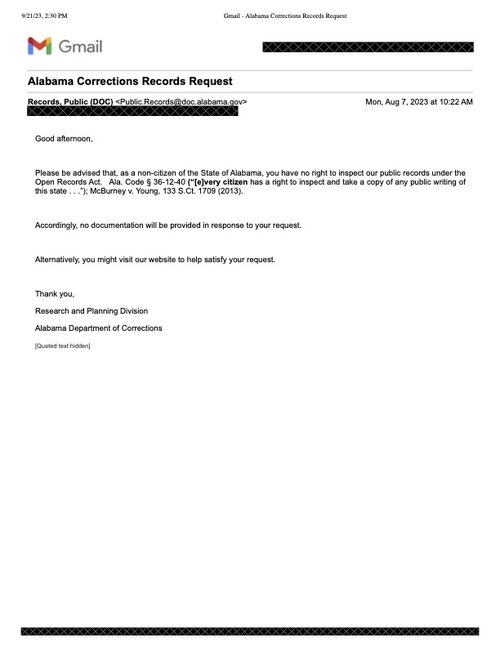DataAlabama
Overview
In Alabama, felony murder is listed as a subsection in the state’s “general murder” statute (Ala. Code § 13A-6-2).
Prosecutors can charge and convict any person of murder without having to prove that they intended to cause another person’s death. Prosecutors must only prove that a person or an accomplice committed or attempted to commit another specified felony and that a death occurred “in the course of and in furtherance of the crime…or in immediate flight therefrom,” in the course of and in furtherance of the offense or immediate flight from the offense.” Prosecutors can prove murder even when the death was caused by a third non-party (i.e. neither the person nor their accomplice). There is no possibility in Alabama for a person charged with felony murder to raise an affirmative defense–i.e. that he or she acted under duress, that they weren’t armed and had no reason to believe another participant was armed or intended to engage in conduct likely to result in death.
A conviction for felony murder carries a sentence of 10-99 years of incarceration and is eligible for the death penalty.
Analysis: Race
Race and Conviction Rate:
In Alabama, you are 13.0775 times more likely to be charged with felony murder if you are Black than if you are white.
Disproportionate Representation
While Black individuals account for only 26.8% of Alabama's population
they make up 83% of all people charged with felony murder from 2009-2017.
In terms of gender, 12.81% of those charged with felony murder during this time were women.
Analysis: Charging and Convictions
Between 2009-2017 in Alabama, out of all 281 persons charged with felony murder (comprising 9.86% of all murder charges),
70% were convicted of felony murder.
Analysis: Youthful Impact
Young people in Alabama are disproportionately impacted by felony murder.
-
34.4
Average age at the time of charge for all crimes
-
25.6
Average age at the time of charge for felony murder
Data Request Process
| Request Responsiveness | |||||
| Financial Accessibility | |||||
| Timeliness | |||||
| No Residency Required | |||||
| Appeal Responsiveness |
*These factors track the process--i.e. the effort and obstacles--for obtaining data from individual states under the Freedom of Information Act (FOIA) request and appeals process. These factors do not measure the quality of the data; only the process of attempting to obtain the data.
"Please be advised that, as a non-citizen of the State of Alabama, you have no right to inspect our public records. Accordingly, no documentation will be provided in response to your request."
How We Collected Our Data
We reached our findings using summary statistics provided by Measures for Justice, as well as population data from the U.S. Census.
Alabama requires residency in the state to request public records; our public records request to the Alabama Department of Corrections was denied. Additionally, the data available via the public “inmate search” does not include a differentiated felony murder statute or sufficient description to identify felony murder.
Measures for Justice was able to provide demographic breakdowns of felony murder charges and convictions up until 2017. To provide these statistics, Measures for Justice drew on data they received from the Alabama Administrative Office of the Courts in 2019, and published to their National Data Portal. All disparity calculations were run by the Felony Murder Reporting Project.
Access the Data
Learn more about how you can contribute to transparency when it comes to felony murder.
This analysis covers those charged with felony murder from 2009-2017.
